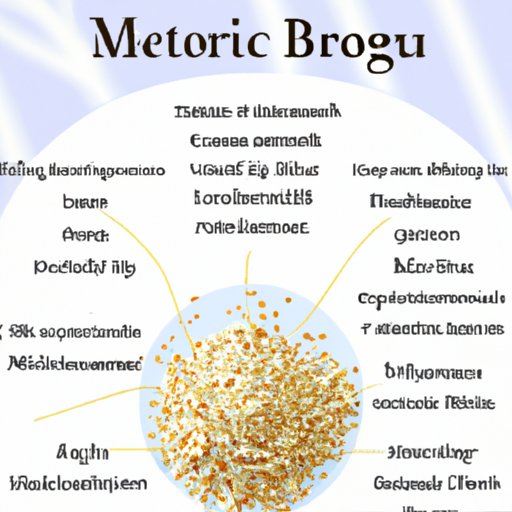Introduction
A macrobiotic diet is a largely plant-based lifestyle that emphasizes whole grains, beans, vegetables, fish, and other natural foods. It’s based on the idea that food should be consumed in harmony with nature. The diet has been around for centuries, but it’s become increasingly popular in recent years as people have become more aware of their health and the importance of healthy eating.
Definition of Macrobiotic Diet
The term “macrobiotic” comes from the Greek words for “large” and “life.” The macrobiotic diet is based on the belief that food should be consumed in harmony with nature, and should be balanced between yin and yang. Yin and yang are two opposing forces in the universe that balance each other out. According to macrobiotic philosophy, foods that are high in yin energy should be balanced out with foods that are high in yang energy.

Overview of Benefits of Macrobiotic Diet
There are many potential benefits to following a macrobiotic diet. According to the American Journal of Clinical Nutrition, the diet has been linked to a reduced risk of cardiovascular disease, diabetes, and cancer. Additionally, research suggests that the diet may help improve digestion, boost energy levels, and reduce inflammation.
Origins of Macrobiotic Diet
The macrobiotic diet originated in Japan in the 19th century. It was developed by a Japanese philosopher named George Ohsawa. He believed that food should be consumed in harmony with nature, and that by eating the right foods, we could achieve physical and emotional balance. The diet quickly spread to other parts of the world, and today it is practiced by people in countries all over the globe.
Beliefs and Principles
The macrobiotic diet is rooted in ancient Chinese and Japanese philosophies. It is based on the idea that food should be consumed in harmony with nature, and that by eating the right foods, we can achieve physical and emotional balance. The diet is also based on the belief that certain foods can help us maintain our health and well-being. For example, according to macrobiotic philosophy, eating whole grains helps to nourish the body, while consuming animal products can lead to an imbalance of energy.
Closer Look at What You Eat
The macrobiotic diet consists of primarily plant-based foods, including whole grains, beans, legumes, vegetables, and sea vegetables. Animal proteins such as fish, eggs, and dairy are allowed, but they should only be consumed in moderation. As far as processed and refined foods, they should be avoided, as they can disrupt the yin and yang balance.

Foods to Avoid and Include
When following a macrobiotic diet, it’s important to avoid processed and refined foods, as well as foods that are high in sugar, fat, and salt. It’s also important to avoid caffeine, alcohol, and other stimulants. Instead, focus on eating whole grains, vegetables, beans, and legumes, as well as fish, eggs, and dairy in moderation. Additionally, it’s important to include fermented foods, such as miso, tempeh, and pickles, as they can help promote good digestive health.
Nutritional Benefits
The macrobiotic diet is rich in fiber, vitamins, minerals, and healthy fats, making it a nutritious choice for those looking to improve their overall health. Research suggests that the diet may help reduce the risk of heart disease, diabetes, and certain types of cancer. Additionally, the diet is low in saturated fat and cholesterol, making it a good choice for those looking to lower their risk of heart disease and stroke.
Getting Started with the Macrobiotic Diet
If you’re interested in trying the macrobiotic diet, the first step is to understand the principles behind the diet. The key is to create a balance between yin and yang energies, and to focus on eating whole, natural foods. Once you understand the principles, it’s time to start meal planning. Aim to include a variety of whole grains, beans, legumes, vegetables, and sea vegetables in your meals. Additionally, try to include fermented foods, such as miso and tempeh, as they can help promote good digestive health.

Common Misconceptions about Macrobiotic Diet
Despite its many benefits, there are still some misconceptions about the macrobiotic diet. Here are a few of the most common:
Misconception #1: The Macrobiotic Diet Is Too Restrictive
The macrobiotic diet is not overly restrictive. While it does require some dietary changes, it doesn’t eliminate entire food groups or require you to follow a specific set of rules. Instead, it encourages you to focus on eating whole, natural foods and to create a balance between yin and yang energies.
Misconception #2: The Macrobiotic Diet Is Expensive
The macrobiotic diet doesn’t have to be expensive. While it does require some specialty items, such as sea vegetables and fermented foods, most of the ingredients used in the diet are widely available and relatively inexpensive. Additionally, the diet can be tailored to fit any budget.
Misconception #3: The Macrobiotic Diet Is Not Sustainable
Contrary to popular belief, the macrobiotic diet is sustainable. It doesn’t require you to purchase expensive supplements or special products, and it encourages you to make smart food choices that will benefit your health in the long run.
Conclusion
The macrobiotic diet is a largely plant-based lifestyle that emphasizes whole grains, beans, vegetables, fish, and other natural foods. It has been linked to a reduced risk of cardiovascular disease, diabetes, and cancer, as well as improved digestion, energy levels, and overall health. To get started with the diet, it’s important to understand the principles behind it and to focus on eating whole, natural foods. With some knowledge and dedication, the macrobiotic diet can be a sustainable and beneficial lifestyle choice.
(Note: Is this article not meeting your expectations? Do you have knowledge or insights to share? Unlock new opportunities and expand your reach by joining our authors team. Click Registration to join us and share your expertise with our readers.)
